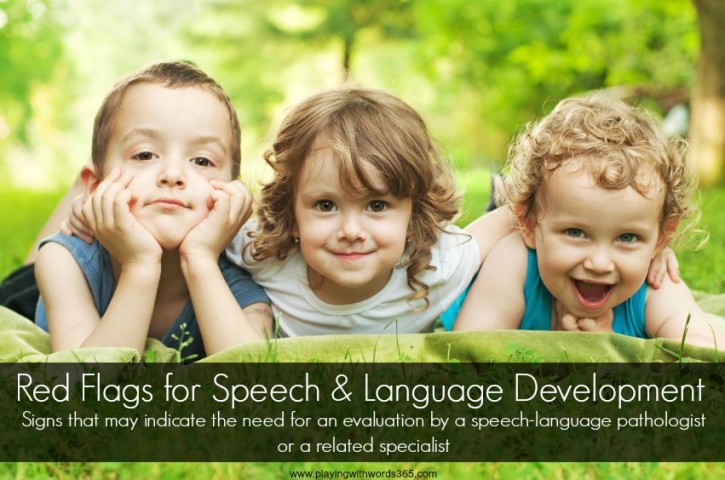Every child develops differently and at different rates. However, there are some very important skills that need to be developed in order for the child to grow and thrive as he/she continues to develop. These foundational skills are crucial for speech and language development and if not observed by certain ages we see this as a red flag that may indicate your child should be evaluated by a speech-language pathologist or a related specialist (early interventionist, psychologist, etc).
A note on the “wait and see” approach: It is a MYTH that you should just “wait and see” if your child is a “late talker.” The “wait and see” approach can be appropriate in some circumstances, which a speech-language pathologist may even recommend upon seeing your child, however I STRONGLY encourage you to have your child screened or assessed by a speech pathologist if you have ANY concerns with his/her development at ANY AGE. The SLP can determine if the wait and see approach is appropriate for your child or not. DO NOT WAIT UNTIL AGE THREE if you have concerns at TWO! If you have concerns at two, get your child in at two. The advice to “wait until three” is not appropriate for every child and can, for some children, actually be detrimental to their development.
A note on pediatricians: Pediatricians are wonderful medical doctors…however they have VERY LITTLE training in speech & language development. They are trained to diagnose and treat medical issues, not speech & language issues. If your gut tells you something is wrong with your child and your pediatrician says to wait, go with your gut. Get your child seen by a speech-language pathologist.
With that…here are some red flags that may indicate your child should be assessed by a speech-language pathologist or related professional.

Under 18 months
- No big smiles or other warm, joyful expressions by 6 months
- No back-and-forth sharing of sounds, smiles, or other facial expressions by 9 months or thereafter
- No babbling by 12 months
- Does not respond to his/her name by 12 months
- No sharing/reciprocal interactions like pointing, sharing, reaching or waving by 12 months
- No pointing at objects of interest by 14 months (pointing at a car driving by)
- Does not understand simple common words like mama or milk
- Is not using any words by 16 months
- Does not imitate gross motor movements like clapping or stomping feet
By 18 Months
- Does not use at least 8-10 meaningful words
- Does not follow simple commands like “come here” “stop” “don’t” “give me the __________” or “touch your nose”
- Does not follow your pointing with his gaze
- Is not playing “pretend” with items (talking on toy phone, feeding a doll)
- Does not play in proximity to other children
By Age Two
- No two-word meaningful phrases (without imitating or repeating) by 24 months
- Does not follow simple two step commands such as “Get the ball and put it on the table”
- Speech is not at least 50% understandable
- Cannot point to pictures of items in books when asked
By Three Years
- Is not using three and four word sentences
- Speech is not at least 75% or more understandable
- Child is leaving the beginnings or ends off of most words
- Cannot accurately answer yes/no questions
- Cannot answer simple “wh” questions like “who is that” or “where is the truck”
- Does not play with other children
- Is experiencing stuttering behavior for more than 6 months
By Four to Five  Years
- Is not 90-100% understandable to strangers despite age appropriate articulation errors (may not be able to say /r, sh, ch, l, or th yet)
- Is not consistently using 4+ word, complex  sentences
- Is not asking a variety of questions to gain information (who, what, where, why and when)
- Is having difficulty with grammar or pronoun use
- Cannot tell a simple story on topic
- Canot follow simple two step directions
- Has difficulty answering simple who, what, where and why questions
- Is not yet able to name a few  letters, numbers, and rhyming words
Overall Warning Signs
- ANY loss of speech or babbling or social skills at ANY age
- Never gestures or imitates
- Does not appear to understand speech, or appears to be unable to hear
- Never develops words beyond repeating others over and over
********************************************************************************************
Resources:
First Signs (National Nonprofit Organization). Retrieved from http://www.firstsigns.org/concerns/flags.htm, 9-27-2011
Centers for Disease Control and Prevention. Retrieved from http://www.cdc.gov, 9-27-2011